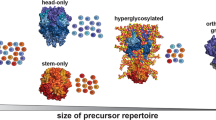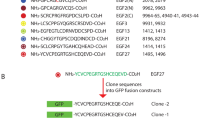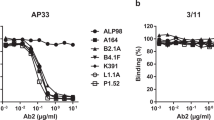Abstract
Recent studies have shown that short chemically synthesized peptides very often induce antibodies which react with the cognate sequence in the intact folded protein. Since such antibodies react with known regions of proteins, they are of predetermined specificity and offer a precision not previously possible with immunological probes1. A basic concept emerging from the use of such antibodies in viral systems is that the differential immunogenicity of closely related proteins can be mimicked by short peptides which span the regions of sequence variation2,3. To generalize this concept, we have studied the two Thy-1 proteins which vary by only a single amino acid. Chemically synthesized peptides differing in only one out of 19 amino acids were able to induce allospecific antisera. Thus, single amino acid changes have similar effects on the immunogenicity of proteins and small peptides, even though the latter are free from constraints provided by neighbouring structures in the tertiary configuration of the intact folded proteins.
This is a preview of subscription content, access via your institution
Access options
Subscribe to this journal
Receive 51 print issues and online access
$199.00 per year
only $3.90 per issue
Buy this article
- Purchase on Springer Link
- Instant access to full article PDF
Prices may be subject to local taxes which are calculated during checkout
Similar content being viewed by others
References
Lerner, R. A. Nature 299, 592–596 (1982).
Bittle, J. L. et al. Nature 298, 30–33 (1982).
Gerin, J. L. et al. Proc. natn. Acad. Sci. U.S.A. 80, 2365–2369 (1983).
Reif, A. F. & Allen, J. M. V. J. exp. Med. 120, 413–433 (1964).
Williams, A. F. & Gagnon, J. Science 216, 696–703 (1982).
Elder, J. H. & Alexander, S. Proc. natn. Acad. Sci. U.S.A. 79, 4540–4544 (1982).
Barclay, A. N., Letarte-Muirhead, M. & Williams, A. F. Nature 263, 563–567 (1976).
Alexander, H. & Lerner, R. A. Advances in Hepatitis Research (ed. Chisari, F. E.) (Masson, New York, in the press).
Niman, H. L. et al. Proc. natn. Acad. Sci. U.S.A. 80, 4949–4953 (1983).
Green, N. et al. Cell 28, 477–487 (1982).
Coons, A. H., Leduc, E. & Connolly, J. J. exp. Med. 102, 49–55 (1955).
Boyse, E. A., Old, L. & Stockert, E. Ann. N. Y. Acad. Sci. 99, 574–579 (1962).
Laemmli, U. K. Nature 227, 680 (1970).
Towbin, H., Staehelin, T. & Gordon, J. Proc. natn. Acad. Sci. U.S.A. 76, 4350–4354 (1979).
Johnson, D. A., Gautsch, J. W., Sportsman, J. R. & Elder, J. H Gene analyt. Tech. (in the press).
Author information
Authors and Affiliations
Rights and permissions
About this article
Cite this article
Alexander, H., Johnson, D., Rosen, J. et al. Mimicking the alloantigenicity of proteins with chemically synthesized peptides differing in single amino acids. Nature 306, 697–699 (1983). https://doi.org/10.1038/306697a0
Received:
Accepted:
Issue Date:
DOI: https://doi.org/10.1038/306697a0
This article is cited by
-
Characterization of neutralizing antibodies to bovine enterovirus elicited by synthetic peptides
Archives of Virology (1992)
Comments
By submitting a comment you agree to abide by our Terms and Community Guidelines. If you find something abusive or that does not comply with our terms or guidelines please flag it as inappropriate.



